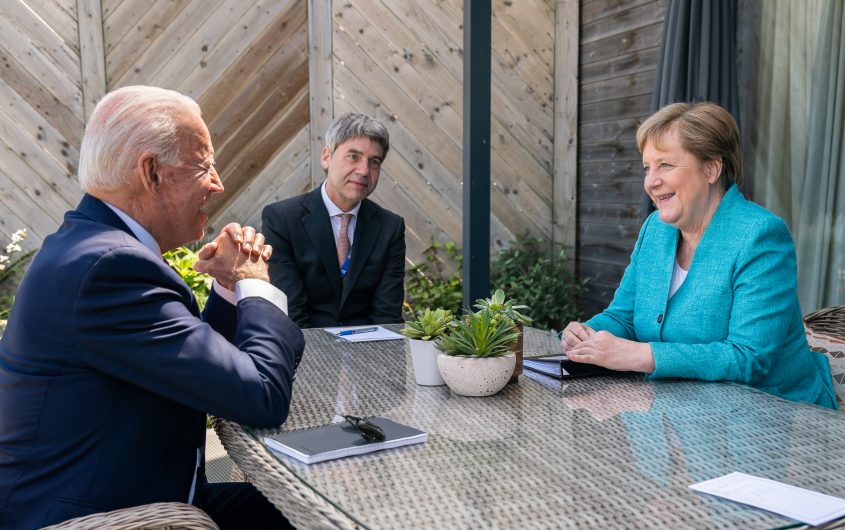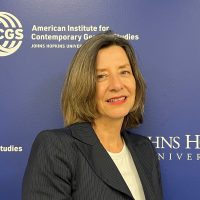
Official White House Photo by Adam Schultz
AGI Experts Preview Merkel’s Visit to Washington

Elizabeth Hotary
Communications Officer
Elizabeth Hotary is the Communications Officer at AICGS. She creates and implements communications strategies, coordinates publishing activities, and manages media relations. She contributes to AICGS research on workforce education and immigration and integration and has co-led AICGS study tours across the United States and Germany. Before joining AICGS, she taught English at a secondary school in Herne, Germany, as part of the Fulbright Program. During her time as a Fulbrighter, she also volunteered with the U.S. Consulate Düsseldorf’s MeetUS program, where she traveled to schools across North Rhine Westphalia to speak with secondary school students about the United States. She has previous experience at the University of Denver's Josef Korbel School’s Office of the Dean and WorldDenver, a nonprofit global affairs organization.
Ms. Hotary received her MA from the Josef Korbel School of International Studies at the University of Denver, where she was a Marc Nathanson Fellow. She graduated magna cum laude from the University of Arkansas with degrees in International Relations, European Studies, and German. She is an alumna of the Aspen Seminar for Young European Leaders "Next-Gen Europe: Leading for Values."
__

Eric Langenbacher
Senior Fellow; Director, Society, Culture & Politics Program
Dr. Eric Langenbacher is a Senior Fellow and Director of the Society, Culture & Politics Program at AICGS.
Dr. Langenbacher studied in Canada before completing his PhD in Georgetown University’s Government Department in 2002. His research interests include collective memory, political culture, and electoral politics in Germany and Europe. Recent publications include the edited volumes Twilight of the Merkel Era: Power and Politics in Germany after the 2017 Bundestag Election (2019), The Merkel Republic: The 2013 Bundestag Election and its Consequences (2015), Dynamics of Memory and Identity in Contemporary Europe (co-edited with Ruth Wittlinger and Bill Niven, 2013), Power and the Past: Collective Memory and International Relations (co-edited with Yossi Shain, 2010), and From the Bonn to the Berlin Republic: Germany at the Twentieth Anniversary of Unification (co-edited with Jeffrey J. Anderson, 2010). With David Conradt, he is also the author of The German Polity, 10th and 11th edition (2013, 2017).
Dr. Langenbacher remains affiliated with Georgetown University as Teaching Professor and Director of the Honors Program in the Department of Government. He has also taught at George Washington University, Washington College, The University of Navarre, and the Universidad Nacional de General San Martin in Buenos Aires, Argentina, and has given talks across the world. He was selected Faculty Member of the Year by the School of Foreign Service in 2009 and was awarded a Fulbright grant in 1999-2000 and the Hopper Memorial Fellowship at Georgetown in 2000-2001. Since 2005, he has also been Managing Editor of German Politics and Society, which is housed in Georgetown’s BMW Center for German and European Studies. Dr. Langenbacher has also planned and run dozens of short programs for groups from abroad, as well as for the U.S. Departments of State and Defense on a variety of topics pertaining to American and comparative politics, business, culture, and public policy.
__

Gale Mattox
Senior Fellow
Dr. Gale A. Mattox is a Senior Fellow at AGI. She was previously Director of the Foreign & Security Policy Program at AICGS and a Professor in the Political Science Department at the U.S. Naval Academy. She is a former elected department chair and chair of chairs, and was awarded the Distinguished Fulbright-Dow Research Chair at the Roosevelt Center in the Netherlands 2009, Fulbright Scholar for NATO Strategic Studies in Brussels in Summer 2017, and Woodrow Wilson International Center for Scholars Fellow in 2016-17. Dr. Mattox served on the Policy Planning Staff of the Department of State, was a Council on Foreign Relations Fellow at the State Department Office of Strategic and Theater Nuclear Policy, and an International Affairs Analyst at the Congressional Research Service.
She has been a Bosch Fellow in Germany (also Founding President of the Bosch Alumni Association), NATO Research Fellow, and a Fulbright PhD Scholar. Dr. Mattox has held the offices of President (1996-2003) and Vice President of Women in International Security (WIIS); Adjunct Professor, Center for Peace and Security Studies at Georgetown University; and served as Vice President of the International Studies Association and co-chair of the ISA Women’s Caucus.
She has served on numerous boards, including the Tactical Advisory Council, Center for Naval Analysis, and the George Marshall Center Advisory Board in Germany; the advisory boards of St. Mary’s College Women’s Center, the Forum for Security Studies at the Swedish National Defense University, and WIIS. Dr. Mattox published Coalition Challenges in Afghanistan: The Politics of Alliance with S. Grenier, Enlarging NATO: The National Debates with A. Rachwald, and Evolving European Defense Policies with C. Kelleher. She is the co-editor of Germany in Transition, Germany at the Crossroads, and Germany Through American Eyes, and has published widely in scholarly journals. She holds numerous awards and has appeared on the Lehrer News Hour and other media outlets. She holds a PhD from the University of Virginia.
__

Jeff Rathke
President of AGI
Jeffrey Rathke is the President of the American Institute for Contemporary German Studies at the Johns Hopkins University in Washington, DC.
Prior to joining AICGS, Jeff was a senior fellow and deputy director of the Europe Program at CSIS, where his work focused on transatlantic relations and U.S. security and defense policy. Jeff joined CSIS in 2015 from the State Department, after a 24-year career as a Foreign Service Officer, dedicated primarily to U.S. relations with Europe. He was director of the State Department Press Office from 2014 to 2015, briefing the State Department press corps and managing the Department's engagement with U.S. print and electronic media. Jeff led the political section of the U.S. Embassy in Kuala Lumpur from 2011 to 2014. Prior to that, he was deputy chief of staff to the NATO Secretary General in Brussels. He also served in Berlin as minister-counselor for political affairs (2006–2009), his second tour of duty in Germany. His Washington assignments have included deputy director of the Office of European Security and Political Affairs and duty officer in the White House Situation Room and State Department Operations Center.
Mr. Rathke was a Weinberg Fellow at Princeton University (2003–2004), winning the Master’s in Public Policy Prize. He also served at U.S. Embassies in Dublin, Moscow, and Riga, which he helped open after the collapse of the Soviet Union. Mr. Rathke has been awarded national honors by Estonia, Latvia, and Lithuania, as well as several State Department awards. He holds an M.P.P. degree from Princeton University and B.A. and B.S. degrees from Cornell University. He speaks German, Russian, and Latvian.
__

Peter S. Rashish
Vice President; Director, Geoeconomics Program
Peter S. Rashish, who counts over 30 years of experience counseling corporations, think tanks, foundations, and international organizations on transatlantic trade and economic strategy, is Vice President and Director of the Geoeconomics Program at AICGS. He also writes The Wider Atlantic blog.
Mr. Rashish has served as Vice President for Europe and Eurasia at the U.S. Chamber of Commerce, where he spearheaded the Chamber’s advocacy ahead of the launch of the Transatlantic Trade and Investment Partnership. Previously, Mr. Rashish was a Senior Advisor for Europe at McLarty Associates, Executive Vice President of the European Institute, and a staff member and consultant at the International Energy Agency, the World Bank, UNCTAD, the Atlantic Council, the Bertelsmann Foundation, and the German Marshall Fund.
Mr. Rashish has testified before the House Financial Services Subcommittee on International Monetary Policy and Trade and the House Foreign Affairs Subcommittee on Europe and Eurasia and has advised three U.S. presidential campaigns. He has been a featured speaker at the Munich Security Conference, the Aspen Ideas Festival, and the Salzburg Global Seminar and is a member of the Board of Directors of the Jean Monnet Institute in Paris and a Senior Advisor to the European Policy Centre in Brussels. His commentaries have been published in The New York Times, the Financial Times, The Wall Street Journal, Foreign Policy, and The National Interest, and he has appeared on PBS, CNBC, CNN, NPR, and the BBC.
He earned a BA from Harvard College and an MPhil in international relations from Oxford University. He speaks French, German, Italian, and Spanish.

Susanne Dieper
Director of Programs and Grants
Susanne Dieper is the Director of Programs and Grants at AICGS. She oversees the Institute’s programs and projects within the three AICGS program areas, manages all AICGS fellowships, and is in charge of grant writing. Her current focus is on issues related to transatlantic relations, immigration and integration, diversity, the next generation of leaders, workforce education, and reconciliation. She develops programs that align with the mission of AICGS to better understand the challenges and choices facing Germany and the United States in a broader global arena.
Previously, Ms. Dieper was in charge of organizational and project management at AICGS as well as human resource development and board of trustees relations. Prior to joining AICGS, she worked in transatlantic exchange programs, language acquisition, as well as the insurance industry in Germany.
Ms. Dieper holds an MBA from Johns Hopkins University with a concentration in International Business and an MA in English Linguistics and Literature, History, and Spanish from the University of Cologne. She has completed course work in nonprofit management at Johns Hopkins University.
__

Yixiang Xu
China Fellow; Program Officer, Geoeconomics
Yixiang Xu is the China Fellow and Program Officer, Geoeconomics at AGI, leading the Institute’s work on U.S. and German relations with China. He has written extensively on Sino-EU and Sino-German relations, transatlantic cooperation on China policy, Sino-U.S. great power competition, China's Belt-and-Road Initiative and its implications for Germany and the U.S., Chinese engagement in Central and Eastern Europe, foreign investment screening, EU and U.S. strategies for global infrastructure investment, 5G supply chain and infrastructure security, and the future of Artificial Intelligence. His written contributions have been published by institutes including The Chinese Academy of Social Sciences, The United States Institute of Peace, and The Asia Society's Center for U.S.-China Relations. He has spoken on China's role in transatlantic relations at various seminars and international conferences in China, Germany, and the U.S.
Mr. Xu received his MA in International Political Economy from The Josef Korbel School of International Studies at The University of Denver and his BA in Linguistics and Classics from The University of Pittsburgh. He is an alumnus of the Bucerius Summer School on Global Governance, the Global Bridges European-American Young Leaders Conference, and the Brussels Forum's Young Professionals Summit. Mr. Xu also studied in China, Germany, Israel, Italy, and the UK and speaks Mandarin Chinese, German, and Russian.
__
Securing a Transatlantic Legacy
Jeff Rathke, President
Chancellor Merkel makes her last official visit to Washington just weeks before the September 26 Bundestag election will punctuate her path-breaking career as a stateswoman. It is fitting that one of her last international engagements will happen in the United States, Berlin’s most important partner outside Europe and still a cornerstone of German foreign policy. The story goes that Merkel decided in 2016 to run for a fourth term in reaction to Donald Trump’s election and Brexit (but also to see her country through the migration crisis and ensure her legacy). She carried the baton of transatlantic partnership for four years, enduring enormous criticism and animosity but preserving the ability of the United States and Europe to act together.
Merkel will leave office later this year ranked with Helmut Kohl as modern Germany’s longest-serving chancellor. She is the country’s first head of government from East Germany and its first woman chancellor, but she has transcended these categories, overseeing a revival of the German economy and a strengthening of its international influence.
On July 15, she will meet with President Biden, not for the first time, but for her longest exchange with the president who pledged to restore America’s international relationships. The most important message will be the visit itself: that the German Chancellor is the first European national leader to visit the White House during this administration. Merkel has the opportunity with President Biden to define a common agenda that will endure beyond her departure and shape the approach of the advanced democracies to a changed world. Biden and Merkel will not see eye to eye on every issue, but they will be linked by an abiding conviction that U.S.-German ties will be decisive for the future and that success will only be achieved together.
Look to the EU
Peter Rashish, Director, Geoeconomics Program
When Angela Merkel arrives in Washington later this month for her meeting with President Biden, it will occur with the backdrop of U.S. Secretary of State Antony Blinken’s recent assertion that “the United States has no better partner, no better friend in the world than Germany.” But by happenstance, the July 15th Biden-Merkel meeting will immediately follow national day celebrations in France, the oldest U.S. ally. The Chancellor should keep this calendar juxtaposition in mind. For as important as the purely bilateral elements of the German-American relationship are, what will increasingly determine the quality of strategic cooperation between Washington and Berlin will be Germany’s role in the European Union. That starts with its relations with France, which produced important progress on European financial integration with last year’s NextGen EU recovery plan. Biden should impress upon Merkel how important his administration takes greater U.S.-EU alignment—particularly at the nexus of economics, values, and security. That means placing the accent on a joint climate agenda, new global trade rules that level up the playing field vis-à-vis China, and high standards for technologies like artificial intelligence.
Building on the Summits
Gale Mattox, Director, Foreign & Security Policy Program
Chancellor Merkel comes to Washington with a full agenda and an important task: to pass on a reinforced allied relationship to her successor. The NATO, EU, and G7 summits in June demonstrated transatlantic renewal. But will the new summit glow overcome critical differences?
It will not be easy in three areas of security: 1) allied strategy in the competition with China and Russia, 2) emerging technologies, and 3) Afghanistan.
Competition with Russia and China is fundamental. Their military modernizations require a coherent alliance strategy. General Secretary Xi at the 100th anniversary of the Chinese Communist Party called for a ‘Great Wall of Steel’ protecting China, a major challenge for the United States and its partners. A common strategy will require NATO and the EU to balance contending security, political, economic, and human rights issues.
The recent Franco-German initiative for dialogue with Russia failed to get EU support, but Russia will be high on the agenda for the Merkel and Biden, including strengthening NATO’s Enhanced Forward Presence in the Baltics, Moscow’s massing of troops on the border of Ukraine, Belarus’ rising discontent, and human rights issues (Russian opposition Navalny, Belarusian journalist Pratasevich, others).
Emerging technologies including cyber, AI, and space as well as nuclear proliferation are all in need of close German-American consultation and European coordination. Growing Chinese nuclear capabilities complicate future arms control. At stake is global stability.
In Afghanistan, the $12 billion in assistance over four years pledged at last year’s international conference must continue as U.S. and NATO troops depart. A multilateral (“Bonn”) conference to continue allied collaboration could map a more stable way forward.
A New View on China?
Yixiang Xu, China Fellow; Program Officer, Geoeconomics
Merkel faces a difficult dilemma over Germany’s China policy at the end of her tenure. Public opinion on China in Germany and the EU now demands a much more critical approach to dealing with China’s human rights abuses in Xinjiang and Hong Kong as well as its aggressive “Wolf Warrior” diplomacy. Countering China’s trade and investment practices and Beijing’s technology ambitions underpin the revival of transatlantic relations as the United States is propelled by strong bipartisan calls to step up strategic competition with China. But Merkel seems determined to follow her business-centric, engagement approach to Beijing until the end, which has often meant nurturing Germany’s already heavily dependent economic ties with China and diluting the EU’s collective assertion of European values.
While Merkel’s visit is unlikely to spur either transatlantic frictions or new initiatives on China, the Biden administration can be confident that changing political moods in Europe will aid its persistent efforts to win European support for U.S. policy toward China, from 5G network security to global infrastructure development. A new coalition government in Berlin, possibly including the China-critical Green Party, could drive her successor to adapt Berlin’s China policy to better reflect China’s challenge to Germany’s economic and political interests.
It would be nice to see bilateral discussions on trade and technology move beyond defensive policy instruments against unfair Chinese trade and investment practices. Converging German and U.S. interests in preserving their technological competitiveness in the face of Chinese ambition to dominate critical and emerging technologies could create a new frontier for transatlantic cooperation in research and development and standards setting. But implementing such aspirations may have to wait until a new German government is in place.
A Wide-Ranging Transatlantic Agenda
Eric Langenbacher, Director, Society, Culture & Politics Program
The much-anticipated meeting of German Chancellor Angela Merkel and U.S. President Joe Biden in Washington, DC, will be a wide-ranging discussion, signifying the restart of this important bilateral relationship after the strains of the previous administration.
Biden will likely bring up longstanding U.S. concerns around Nord Stream 2 and Germany’s inability to meet the 2 percent NATO defense spending goal, but they will not define this visit, as Biden appears to have softened his administration’s stance. Biden will also want to hear Merkel’s opinion on the profiles of her possible successors, as well as on the looming 2022 French presidential election.
From Merkel’s side, trade will be a major topic. She likely will express relief over the partial resolution to the Boeing-Airbus dispute and will re-emphasize the need to resolve other trade issues, particularly U.S. tariffs on aluminum and steel.
Both sides will probably discuss overarching policy stances towards China and Russia, the pandemic situation and how collaborative action could help developing countries, and transatlantic action on tackling climate change. They could also touch on developments in Iran with the election of a new hardline president and the future of Afghanistan after all foreign troops are withdrawn.
A West Wing Meeting with Difference in Style, but not Substance
Elizabeth Hotary, Program Officer, Foreign & Security Policy and Society, Culture & Politics
In the six months since President Joe Biden’s inauguration, both his administration and Chancellor Angela Merkel’s government have worked to repair the damage done after four years of former President Trump’s open hostility toward Europe in general and Germany in particular. Appearing on screen with Chancellor Merkel and French President Emmanuel Macron, President Biden declared, “America is back” at a virtual Munich Security Conference event in February. In Berlin, Secretary of State Antony Blinken told the press before meeting with the chancellor that the United States has “no better friend in the world than Germany.” Visits with their counterparts in Washington by Minister of Finance Olaf Scholz, Minister of Economics and Energy Peter Altmaier, and Minister of Defense Annegret Kramp-Karrenbauer have emphasized continued transatlantic cooperation on countering climate change, cooperating on China, and working together to uphold a multilateral, rules-based world order.
Merkel’s visits to Washington during the Trump administration were memorable for their rebuffed handshakes and damage control, not to mention conflicts over tariffs, security, and climate change. And while transatlantic officials are eager to have more fun, Merkel and Biden will likely address enduring transatlantic sticking points. Unless Germany elects a Green chancellor, the Nord Stream 2 pipeline is likely to be completed despite bipartisan American opposition, and Berlin and Washington must ensure Ukraine and Europe’s energy security are not vulnerable to the whims of Moscow. At least one disagreement, however, may not come up on the agenda. While Germany has increased its defense spending commitments, Merkel no longer has any influence on how long it will take Germany to meet the NATO commitment to spend 2 percent of GDP on defense. That is certainly in the hands of her successor.
Skilled Labor and Post-Pandemic Economic Recovery
Susanne Dieper, Director of Programs and Grants
As both countries emerge from the pandemic, economic recovery efforts and the issue of global competitiveness will likely be addressed by President Biden and Chancellor Merkel during their meeting in July.
While the United States continues to add jobs to its post-pandemic economy, fears about labor shortages remain. Even before the pandemic, a lack of skilled trade labor, in part due to the retirement of the baby boomer generation, was alarming. Some U.S. companies are instituting on-the-job training programs, but even though the United States has seen a 70 percent increase in paid apprenticeships in the last ten years, the United States is far behind Europe in this regard.
Germany is also facing an unprecedented skilled labor shortage that experts at the Institute of German Economy (IW) believe can only be stemmed with increased immigration and a rise in retirement age. The German Integration Commissioner Annette Widmann-Mauz recently warned about the lack of trained workers in Germany. In March 2020, the government passed the Skilled Immigration Act, which aims to make it easier to employ foreign workers. Despite these efforts, German companies in spring 2021 again noted an increase in labor shortages and experts expect one third of businesses to suffer from a skilled-labor shortage by the end of 2021.









